- Home
- Cynthia Hand
The Last Time We Say Goodbye Page 13
The Last Time We Say Goodbye Read online
Page 13
Steven and I stop talking as we pass. He clears his throat again, his expression suddenly clouded.
“Lex . . . ,” he starts.
I say, “I know I shouldn’t have called you, but there was nobody else. I’m sorry. Won’t happen again.”
“Of course you should have called me,” he says sharply. “We’re still friends, aren’t we? I thought we were still friends.”
“I don’t know,” I admit. If the definition of the word friend is someone you’re comfortable with, someone it feels good to be around, then Steven and I are definitely not friends.
“I’d like us to be friends, Lex,” he says.
But even coming from him it sounds like a lie.
“Do you want to get something to eat?” he asks as we turn onto 27th. “There’s the Imperial Palace coming up.”
My favorite Chinese place.
That’s where we went out to dinner that night. Does Steven remember?
“No,” I say quickly, before he can turn into the parking lot. “I have dinner waiting for me at home.” An obvious lie. “Plus I have a ton of homework I need to get to,” I throw in for good measure.
He doesn’t call me out on it. We drive for a while, past the restaurant, past a video arcade we always used to go to, past the flower shop where he bought my corsage for the homecoming dance and where we got Ty’s funeral flowers. It’s so quiet I feel like my head is going to implode.
Steven reaches for the radio dial but pauses before he turns it on. “Music?”
Oh God, yes. Music.
“Yes, please.”
We’re flooded with Yo-Yo Ma’s cello playing Bach’s Suite No. 1 in G Major. I close my eyes and let the notes wash over me. This was a bad idea, I think for the thousandth time. But at least we’re more than halfway home.
“So,” Steven says, just when it feels like I might survive this little joyride. “You still won’t call your dad, huh?”
My eyes open. He’s looking at the road, the light from the oncoming headlights moving in lines across his face, but it feels like he’s looking at me.
“No, I don’t call him. Nothing has changed on that front.”
“That’s too bad. I thought maybe, with Ty, it might bring you two together,” he says.
“I don’t want to be together with my dad,” I snap.
We stop at a red. Steven looks at me. The Bach is suddenly not enough to drown the silence.
“Why not?” he asks.
“If my dad hadn’t left us, Ty would still be alive.” It surprises me when I say it. I didn’t know I actually believed it—not in such simple terms, anyway—until the words left my mouth. But I do believe it.
“You don’t know that,” Steven says.
“I don’t need you to be my therapist, Steven,” I say, my sudden anger welcome against whatever else it is that I’m feeling. “I have a therapist.”
“Then what do you need me to be?” he asks, and pins me with those well-meaning brown eyes. “Tell me what you need, Lex, and I’ll do that. I’ll be that.”
I look away. “It’s green.”
“What?”
“The light’s green.”
“Oh.” He steps on the gas. Then he reaches up and turns off the music. Sighs.
“I wish you’d talk to me,” he says. “Tell me what’s going on with you. I know we’re not together anymore, and I respect your wishes about that, but that doesn’t mean I’ve stopped caring about you. I—”
“I’ll tell you what I don’t need,” I interrupt. “I don’t need sneaky love poems. I don’t need you calling my house to check up on me. I don’t need to feel like you’re always there breathing down my neck. That’s what I don’t need.”
He looks confused. “What?”
“I don’t want to talk about it,” I say. “I need a ride home. Okay?”
His jaw tightens. “Okay.”
We go the rest of the way—ten long minutes—without saying another word.
I jump out before we’ve even fully stopped in my driveway. “Thanks for the ride.”
I’m gone before he can form a response. I duck through the first door that’s available: the side door to the garage. But I don’t close the door behind me all the way. I leave it open a crack and watch Steven as he sits for a while, his eyes closed, his hands gripping the wheel.
I’m hurting him. Still.
I was right to hesitate, when Steven asked me to go out with him. Of course I was right. We were destined to break up, the way all early romances are doomed. And now things are awkward with our friends. And we are hurting each other.
I was right.
He opens his eyes and backs the car out, then drives off fast, spraying snow and gravel.
I close the door.
That’s when I realize that I’m in the garage.
I gaze at the spot.
Where my brother died.
They cleaned it up after, some company that does that. There’s no blood here now, no dark stain to mark the place, but there is a chip in the cement. I can’t remember if it was there before, or if it was created by the bullet after it passed through. Which makes me immediately start considering angles and trajectory and velocity, and I don’t want to think about that.
I look around at the last things Ty would have seen: the rusty rakes and shovels lining the wall, the grass-encrusted lawn mower, our broken snowblower, the old wheelbarrow with a flat tire, the barrel of dog food that’s still here even though our dog died a year ago. It smells like dust and motor oil and plants decaying.
It’s a depressing place to die. Dark and cold and dingy.
I imagine the shot, how it must have filled this space with its noise, how it must have deafened him in those few seconds he could hear. I imagine the gunpowder, curling in the air. The smell of blood. The chill of the cement against his cheek as his vision faded.
He would have felt so alone here.
I go inside to the kitchen. I stand for a few minutes staring into the refrigerator, which is like a barren wasteland, it’s so empty, but that’s fine because I’m not hungry anymore. I take out a bottle of Mom’s mandatory Diet Coke—which I’ve been trying to get her to quit on account of the nasty chemicals—and I chug it. The bubbles burn my nose.
I’m almost finished with it when I think I see, out of the corner of my eye, a figure in the reflection of the kitchen window. A flash. Ty.
But when I lower the bottle, when I turn, he’s gone.
Of course.
I toss the bottle in the recycling bin and put my back to the window. From here I have a view of the top of the stairwell. The empty frame of Dad’s graduation photo gleams at me, like it’s trying to get my attention.
Oh, that’s right, I think. The mystery.
How would Sherlock Holmes go about solving this case?
Well, I reason, first it might be a good idea to check to see if there are any other photos missing from where they ought to be. Or if the hunting picture and Dad’s graduation picture are the only two. That’d be a start.
I do a quick mental rundown of where there are pictures. Then I check the mantel over the fireplace in the living room, but nothing’s out of order there. I try Dad’s office, where there’s still a silver framed photo of him and Mom on their fifteenth wedding anniversary. Dad didn’t take it when he left. Mom’s never taken it down. It’s still there, a dusty example of the kind of parental units I used to have. I try the guest bathroom, where years ago Mom framed several photos of Ty and me taking baths together as toddlers, all the private places covered with bubbles but humiliating nonetheless. All those pictures are still in place. Outside of the mother lode in the stairwell, I can’t think of anywhere there are framed photos.
Nothing else is missing. Back to square one.
Clearly I’m no Sherlock Holmes.
But who says they have to be framed photos? it occurs to me suddenly. That sends me to a particular shelf on the bookcase in the basement den, where there’s a row of pho
to albums. Mom and Dad’s wedding. Their honeymoon. Family vacations. And then our baby books, mine and Ty’s both.
Mine is full and well maintained. Mom carefully filled out the family tree and all the details about my birth, like that I was born at 9:46 at night after eleven hours of labor, and I had excellent Apgar scores, and the first three months of my life I spent approximately three and a half hours a day crying for no good reason at all, which is just under the clinical definition of colic. She has the dates and times of all my first accomplishments: my first bath, my first smile, my first steps and words (Da-da, then dog-gy, then Ma-ma, which totally offended my mother), my first teeth, my first haircut, my first friend, where it says Sadie McIntyre in Mom’s perfect cursive. As if I really want to know that stuff.
Ty’s baby book is slimmer. By the time Ty came along, Mom had her hands full with me and no time to spend lovingly documenting every moment of his life. The second kid always gets shafted in the picture department. He’s lucky, I suppose, that he has any photos in his book at all.
It’s hard to thumb through it, but I do.
Ty as a fat and purple sleeping lump.
Ty as an adorable chubby toddler.
Ty on a camping trip, wearing Dad’s Jeep baseball hat, drinking a can of grape Fanta with a straw.
Ty petting Sunny.
Ty in bed, on Elmo sheets, with his dimpled hands clasped and his eyes closed, saying his prayers.
Now I lay me down to sleep.
I skip over the pictures of Ty and me, because something in my chest twists when I look at them, all this carefully archived evidence of what we’ve lost.
His first word was Ma-ma, incidentally. Kiss-up.
It doesn’t take long for me to realize that there are photos missing in this book, too, not just places Mom was too busy to fill in, but empty spaces with the residue of double-sided tape still marking the page. But unlike the framed photos that are MIA, his baby book photos aren’t something I have memorized. I don’t know what’s gone. All I can do at this point is make an educated guess here and there and count the spots where I conclude that a photo has been removed.
Eight photos, in all. Which brings us to a grand total of ten missing photos.
I’m still no closer to understanding what’s going on here. Or why.
I hear footsteps on the floor above me. Part of me freezes for about three seconds, until I recognize the sound of Mom’s jingling keys. She has a rhythm when she gets home: open the coat closet by the door, hang up her coat. Walk to the kitchen and set down the mail in the tray on the kitchen counter. Open one of the cabinets and stick in her purse and her keys. Make herself a cup of instant coffee—or, more recently, a wine cooler or glass of wine.
I’m starting to fear for her liver.
I glance at the clock on the cable box near the basement TV. 6:07.
Mom shouldn’t be home yet.
I take the stairs two at a time. Mom yelps when I pop up at the top.
“Hey,” I say. “Get off early?”
“How was your day?” she asks me, sliding by my question.
Oh, you know, Mom, I think. Fan-freaking-tastic.
“The Lemon died,” I report. “I don’t know if she’s coming back this time. She’s still in the parking lot at Dave’s.”
“Oh no,” Mom exclaims. “How did you get home?”
“I had to get a ride with Steven.”
“Oh.” This has got to be the most loaded “oh” a person has ever uttered.
“Yeah,” I affirm. Awkward city.
Her expression softens. Mom understands breakups. She gives a stilted laugh. “That car of yours definitely has the right name, doesn’t it?”
I nod.
“If only we had some—” she starts to say, and then stops herself.
If only we had some money. To buy a new car.
I try not to scrutinize our family’s financial situation, because if I do, it becomes abundantly clear how my parents’ divorce was the key contributor to all our current cash-flow troubles, and there’s nothing I can do with that information but be mad about it. But I pay attention to numbers. I know that Ty’s death cost $10,995: the casket alone was $2,300, plus all the funeral home fees (embalming, body storage, a cost to rent the mortuary space for the wake, etc., which added up to around $3,895), plus what they charged for the body retrieval and cleanup ($400), plus the flowers ($200), plus the grave space at Wyuka ($1,300) and the cost to dig the grave ($1,000), and finally the headstone, which was an even $2,000.
Mom is a registered nurse, but she’s been on the job for less than a year, so she makes $20.25 an hour. She had a life insurance policy on both Ty and me, but because Ty’s death was a suicide, the insurance company declared that his policy was void. Dad pitched in for half the cost, of course, but he’s not rolling in cash, either. See divorce lawyers and court fees and the money he had to fork over for Mom’s nursing school after he left.
In other words, we’re broke.
See Lexie drive a clunker.
“I don’t really need a car,” I tell Mom now. “When I’m at MIT next year I’ll take the subway. Cambridge has excellent public transportation, which is safer, statistically speaking, than driving a car.”
She smiles sadly and pats my hair. I don’t know if she believes that I’ll get into MIT, but she’ll act like she does. She’ll indulge me. “Good. Then it will be one less thing to worry about,” she says. “Now let’s go figure out what we’re going to do with the Lemon. Then we can get dinner.”
Ironically, the Lemon starts right up for me when we go back for it. Without a hitch or a sputter or anything. She just purrs to life.
“Wouldn’t start, huh?” Mom says from her vantage point in the next parking space over. “Are you sure that’s what happened?” She gives me a look like maybe this whole charade with Steven giving me a ride home may have been a ruse on my part. To spend time with Steven. Because of course I still must like Steven. Because he’s such an upstanding young man.
Maybe Mom doesn’t understand breakups.
“I swear. The car likes to mess with me,” I say. “She’s temperamental.”
Mom nods knowingly and then moves on to the dinner plan.
“How about the Imperial Palace?” she suggests. “You love that place.”
“Meh.” I shrug. “It’s only marginally good.”
She accepts what I say at face value. “All right. We can do better than marginally good, I think.”
“How about the Spaghetti Works? We haven’t been there in forever.” Because it’s too expensive. Not ridiculously expensive, but too expensive for us. “I heard they have a six-dollar spaghetti special. All you can eat.”
“Spaghetti sounds wonderful,” she says. “I could use a glass of red wine about now.”
16.
TIME PASSES. THAT’S THE RULE. No matter what happens, no matter how much it might feel like everything in your life has frozen around one particular moment, time marches on. After my brother died, time passed slowly, with me trudging through all the obligatory activities that I was still expected to do: class, eating, sleeping, brushing my teeth, drying my hair, pretending like I gave a crap. Either that or time disappeared: I found myself on the other side of Christmas without remembering more than an ambiguous pine-scented blur. A calculus final, gone. Whole conversations that I don’t have any memory of.
Now, suddenly, I find that it’s March 3. A big day. A day I was waiting for: the first possible day that I could have expected to hear anything from MIT. After school I go to the mailbox, and there, tucked in the shadows, big and beautiful, is a fat envelope.
I’ve been trying not to think about MIT too much, to refrain from obsessing like some people do or get my hopes unrealistically high—there are other schools, after all, other perfectly decent institutions of higher learning. But MIT is the institution. And somewhere deep inside me, I expected this. I hoped for it, anyway. I dreamed.
I don’t bother going inside.
I tear the letter open and read it standing next to the mailbox.
Dear Alexis,
On behalf of the Admissions Committee, it is my pleasure to offer you admission to MIT. You stood out as one of the most talented and promising students in the most competitive applicant pool in the history of the Institute. Your commitment to personal excellence and principled goals has convinced us that you will both contribute to our community and thrive within our academic environment. We think that you and MIT are a great match.
I swallow down the hard lump in my throat and scan past the details: I have until May 2 to let them know whether I accept their offer, they invite me to attend something called Campus Preview Weekend in April to get a sense of what life on campus would be like, an MIT student will be calling me in the coming weeks, and they urge me to look over the details of my financial aid package. I flip forward and my breath catches—more than forty-three thousand dollars in scholarships.
I read on:
And now for the requisite fine print—I must remind you that this offer of admission is contingent upon your completing the school year with flying colors. Have fun for the rest of your senior year, but please keep your grades up!
I hope you’ll agree with us that MIT is the perfect place to prepare for your future. As a member of our community, you’ll join builders, scholars, entrepreneurs, and humanitarians. Together, you will all make a difference in a world that desperately needs you.
Many congratulations, and once again, welcome to MIT! Now stop reading this and go celebrate.
This is happening.
This is what I’ve wanted from the time I knew what college was about: to get out of Nebraska, to study math with the country’s best instructors, to bounce my ideas off the sharpest minds. To become someone of consequence. I don’t want to be rich or famous, but I want to contribute something significant to the history of human thought.
The Riggs theorem.
That’s my immortality, my idea of heaven. Something people will remember me for after I die.
As I walk back to the house I’m surprised by how, with this letter finally in my hands, I’m not that excited. Not the kind of excited I thought I’d be.

 Boundless
Boundless My Plain Jane
My Plain Jane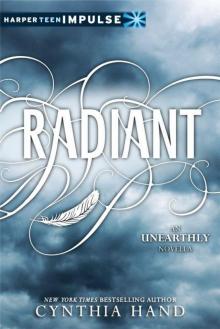 Radiant
Radiant Hallowed
Hallowed 01 Unearthly
01 Unearthly My Lady Jane
My Lady Jane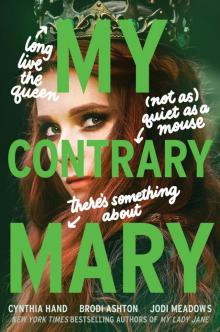 My Contrary Mary
My Contrary Mary Unearthly
Unearthly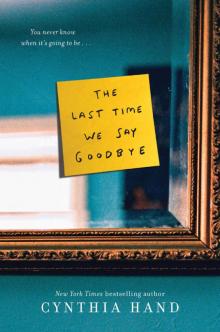 The Last Time We Say Goodbye
The Last Time We Say Goodbye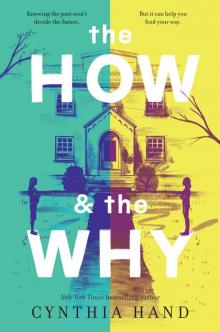 The How & the Why
The How & the Why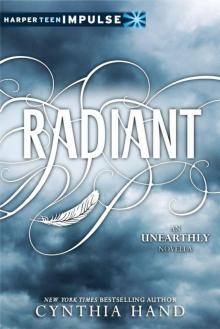 Radiant (HarperTeen Impulse)
Radiant (HarperTeen Impulse) Unearthly u-1
Unearthly u-1 Boundless (Unearthly)
Boundless (Unearthly) My Calamity Jane
My Calamity Jane Hallowed u-2
Hallowed u-2 Hallowed: An Unearthly Novel
Hallowed: An Unearthly Novel